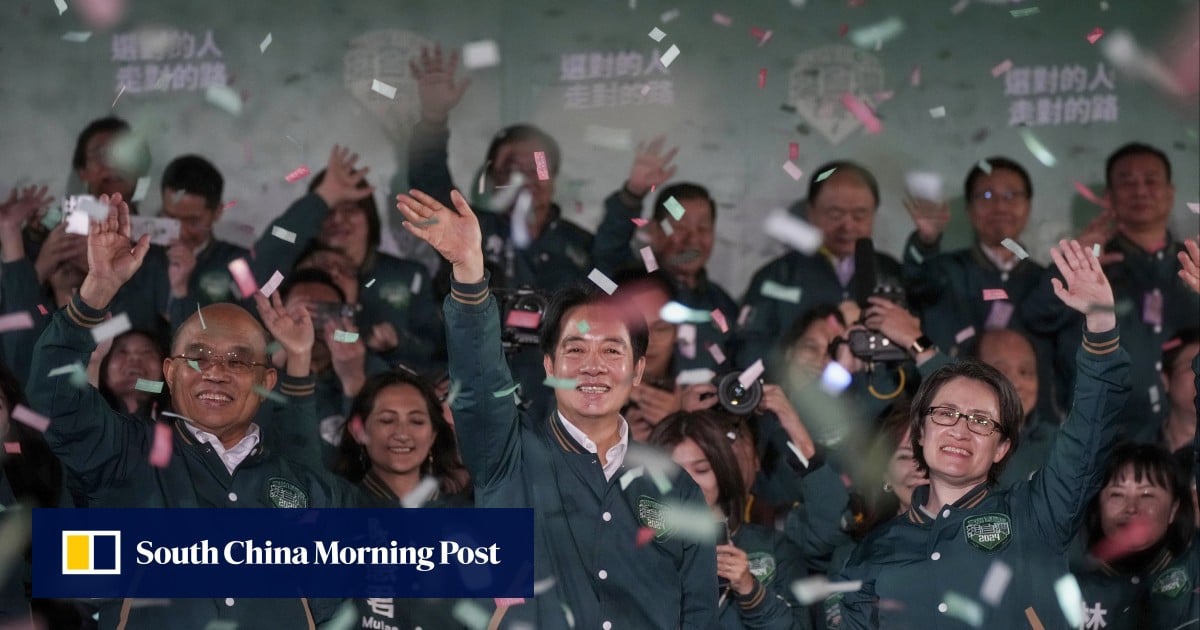Lai took an early lead when counting began at 4pm, eventually finishing with 40 per cent of the total votes cast, or just under 5.6 million.
The election had a turnout of 71.9 per cent – about 14 million people – slightly lower than the 74.9 per cent recorded four years ago.
The result means that the independence-leaning DPP is the first party to secure a third presidential term since the island’s first direct presidential vote in 1996.
Lai, speaking after his victory, said the election “has shown the world the Taiwanese people’s insistence on democracy, and I hope the other side of the Taiwan Strait can also fully understand such a voice”.
But that message received a stony reception in Beijing, which reacted by emphasising its “resolute opposition” to Taiwanese independence, “separatist activities and interference from external forces”.
TAO spokesman Chen Binhua said: “This election cannot change the basic pattern and development direction of cross-strait relations …. nor can it stop the general trend that the motherland will eventually and will inevitably be reunified.”
Earlier, Hou congratulated Lai for his victory and apologised for “letting everybody down”.
“I congratulate Lai Ching-te and Hsiao Bi-khim [Lai’s running mate] and I hope they won’t fail our expectations for the government,” Hou said. “I hope all parties can unite together after the election when we face Taiwan’s challenges.”
Ko, in his concession speech, said his relatively new party had proven itself to be a “key opposition force” and that there was more to Taiwanese politics than the two main parties.
“I saw how much the Taiwanese people love their country. I can again confirm that you are Taiwan’s hope,” he told supporters. “We have proven to the world that democracy has always been Taiwan’s most important asset.”
While most political observers had predicted that Lai would win, his winning margin of 6.5 percentage points was larger than the pre-election opinion polls had predicted.
But this time the DPP suffered a setback in the legislative election, losing its majority in the 113-seat legislature and falling behind the KMT.
The main opposition party took 52 seats, with the TPP taking eight seats and two going to other candidates, a situation that could make it difficult for the DPP to pass bills and implement major reforms when Lai takes office.
‘Taiwan card’: island’s rising strategic value tests Beijing’s diplomacy tactics
‘Taiwan card’: island’s rising strategic value tests Beijing’s diplomacy tactics
On Saturday Lai, the current vice-president said his party would “humbly review” the results, stressing the need to “build an environment of communication, consultation, participation and cooperation” in the Legislative Yuan.
Chang Chun-hao, a political scientist at Taipei’s Tunghai University, said the result of the legislative election may clear the way for policies to promote exchanges with the mainland, such as reducing restrictions on mainland students and tourists.
“Given the TPP now has the power to swing the legislature, it will be difficult for the DPP to put forward policies,” Chang said.
“With the KMT and TPP forming a majority, it could also mean an increase in policies that would promote communication and exchanges,” Chang said, adding that policies for incoming mainland Chinese tourists and students could be loosened in the future.
KMT’s Hou had called for greater cross-strait exchanges including in areas such as education and culture.
Ahead of the polls, China had on Thursday called for voters to “make the right choice at the crossroads of cross-strait relations”, warning that Lai would promote separatist activities and increase the risk of conflict if elected.
Political observers have warned that their victory could trigger a strong reaction from Beijing, which would in turn undermine trust between China and the US.
Beijing sees Taiwan as an inseparable part of China and has never renounced the use of force to bring it back under its control.
The US, in common with most countries, does not recognise Taiwan as an independent state, but it is opposed to a forcible change in the status quo and is legally committed to helping the island defend itself.
International media focus on tensions, security and uncertainty as Taiwan votes
International media focus on tensions, security and uncertainty as Taiwan votes
In his victory speech, Lai appeared to strike a conciliatory tone towards the mainland.
“We must replace encirclement with exchanges, and confrontation with dialogue, in order to achieve peace and co-prosperity, and the only way out is to have peace, equality and a democratic dialogue,” he said.
“This is most in line with the interests of the people of the two sides of the Taiwan Strait, and is the only way to achieve a win-win situation.”
He said he would have an “important responsibility to maintain peace and stability in the Taiwan Strait” as president but added that he was “determined to safeguard Taiwan from continued threats and intimidation from China”.
Lev Nachman, an assistant professor at National Chengchi University in Taiwan, posted on X, formerly Twitter, that Beijing would respond either with “loud military drills” a “more muted set of military threats” or “some angry, aggressive rhetoric”.
“Importantly however, this does not mean war,” he added.

Wang Jianmin, a Taiwan affairs specialist at Minnan Normal University in Fujian province, suggested that Beijing would increase “military deterrence” against Taiwan after Lai is sworn in as president in May.
Although Lai has said he will continue Tsai’s cross-strait policies, which state there is no need for Taiwan to declare independence because it is already sovereign, Wang said he was more radical and “determined” on independence.
“The confrontations will become increasingly fierce,” Wang said.
Daniel Russel, vice-president of the Asia Society Policy Institute and a former US diplomat, said that in many quarters of the US the “assumption is that Beijing will feel bound to punish Taiwan voters”.
But he said Beijing was likely to want to restrain instead of provoke Lai and it may be reluctant to risk the progress it had made in reducing tensions with the US in recent months.
After the election, US Secretary of State Antony Blinken offered his congratulations, saying the Taiwanese people had demonstrated the strength of their democratic system in taking part in “free and fair elections”.
Meanwhile, Japanese Foreign Minister Yoko Kamikawa said Tokyo expected problems to be “resolved peacefully through dialogue, thereby contributing to the peace and stability in the region”.
The European Union congratulated voters who took part in the elections, adding that peace and stability across the Taiwan Strait were key to regional and global security and prosperity.







